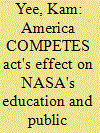| Srl | Item |
| 1 |
ID:
138228


|
|
|
|
|
| Summary/Abstract |
NASA's Education and Public Outreach program performances have historically been poorly evaluated. The programs are fragmented and difficult to track which contributes to the difficulties faced by the United States' struggling education system. In response, the America Creating Opportunities to Meaningfully Promote Excellence in Technology, Education and Science Reauthorization Act of 2010 (America COMPETES) was passed in an effort to streamline federal efforts in Science, Technology, Engineering, and Math education (STEM) and keep the American technical workforce competitive in the global market.America COMPETES' impact on NASA's role in STEM education made little positive changes. The Act's requirements perpetuate misguided STEM education evaluation methods. Funds appropriation marginalize NASA from meaningful K-12 education interactions. Portions of the implementation steps are counter-productive to NASA's public image.
|
|
|
|
|
|
|
|
|
|
|
|
|
|
|
|
| 2 |
ID:
138227


|
|
|
|
|
| Summary/Abstract |
Advocates of space solar power propose its use as a mechanism for solving terrestrial and orbital power problems. These craft collect solar radiation via their solar panels and transmit it in a more concentrated form to receiving spacecraft or ground stations. This more concentrated transmission (e.g., via laser or microwave radiation) alters the power generation equation for the receiving craft or station, as it allows smaller (both in terms of mass and volume) receiving hardware to be utilized. It also offers other prospective benefits, such as the possibility of receiving power in eclipse and the reduced deterioration rate of radio antennas, as compared to solar cells (removing the need to include extra generation capability to offset lifetime deterioration). This paper seeks to answer the question of whether the use of SSP to power other in-space craft is justified, from an economic perspective. It considers factors that can be assessed both quantitatively and qualitatively.
|
|
|
|
|
|
|
|
|
|
|
|
|
|
|
|
| 3 |
ID:
138224


|
|
|
|
|
| Summary/Abstract |
Public engagement (PE) initiatives can lead to a long term public support of science. However most of the real impact of PE initiatives within the context of long-term science policy is not completely understood. An examination of the National Aeronautics and Space Administration's (NASA) and European Space Agency's (ESA) Hubble Space Telescope, James Webb Space Telescope, and NASA's International Sun/Earth Explorer 3 reveal how large grassroots movements led by citizen scientists and space aficionados can have profound effects on public policy. We explore the role and relevance of public grassroots movements in the policy of space astronomy initiatives, present some recent cases which illustrate policy decisions involving broader interest groups, and consider new avenues of PE including crowdfunding and crowdsourcing.
|
|
|
|
|
|
|
|
|
|
|
|
|
|
|
|
| 4 |
ID:
138223


|
|
|
| 5 |
ID:
138225


|
|
|
|
|
| Summary/Abstract |
With the rising number of man-made space objects, space situational awareness becomes increasingly important for space faring nations. International cooperation and exchange of data and information are prerequisites. Different forms of cooperation are possible and national policies have an impact. New players of the information industry can take over roles in space situational awareness. This article examines how principles like international cooperation, responsibility, liability and the obligations to register space objects under the existing space treaties apply to space situational awareness.
|
|
|
|
|
|
|
|
|
|
|
|
|
|
|
|
| 6 |
ID:
138226


|
|
|
|
|
| Summary/Abstract |
The U.S. Government faces acute budgetary deficits and national debt problems in the Obama Administration's second term. These problems have been brought about by decades of unsustainable government spending affecting all federal agencies including the National Aeronautics and Space Administration (NASA). An outgrowth of this fiscal profligacy is the presence of wasteful and duplicative programs within NASA that prevent this agency from achieving its space science and human spaceflight objectives. These programs occur due to mismanagement of these programs by NASA and from the creation of these programs by the U.S. Congress and congressional committees. This occurs because congressional appropriators tend to be more concerned with economically enhancing their states and districts and promoting their reelections instead of providing effectively targeted funding and oversight of their programs to ensure they meet national space policy goals and provide tangible value for taxpayers. This work will examine recent examples of wasteful and duplicative NASA programs and suggest ways to improve their utility.
|
|
|
|
|
|
|
|
|
|
|
|
|
|
|
|